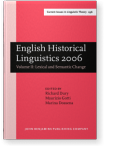Was Old Frech -able borrowable? A diachronic study of word-formation processes due to language contact
Carola Trips | Institut für Linguistik | Germanistik, Universität Stuttgart
 Achim Stein | Institut für Linguistik | Germanistik, Universität Stuttgart
Achim Stein | Institut für Linguistik | Germanistik, Universität Stuttgart
An in-depth corpus study will show that the ability of -able formations to highlight other arguments of the verbal base is present from the start in Old French texts, similarly to findings for Modern French (2003). Old French formations like (par)durable, decevable or changable show that unergatives and unaccusatives can just as well serve as input to -able formations, and that the traditional distinction between transitive and intransitive types cannot account for the variety of derivatives we are already faced with in the Old French period.
We also argue against the assumptions that in Old French the active meaning was clearly dominant and that in ME the free morpheme able explains the rise of the suffix -able. The semantic analysis has shown that an adequate word-formation rule should account for the event structure of the base verb rather than rely on the syntactic or semantic frame alone.
Cited by (3)
Cited by three other publications
Elter, Wiebke Juliane
2023.
Integration of Cognate Loan Verbs in Contact Between Closely Related Languages Effecting Valency Changes. In
Language in Educational and Cultural Perspectives [
Second Language Learning and Teaching, ],
► pp. 237 ff.

Trips, Carola & Peter A. Stokes
2023.
From Original Sources to Linguistic Analysis: Tools and Datasets for the Investigation of Multilingualism in Medieval English. In
Medieval English in a Multilingual Context [
New Approaches to English Historical Linguistics, ],
► pp. 49 ff.

Stein, Achim
2010.
Anhang. In
Einführung in die französische Sprachwissenschaft,
► pp. 209 ff.

This list is based on CrossRef data as of 11 july 2024. Please note that it may not be complete. Sources presented here have been supplied by the respective publishers.
Any errors therein should be reported to them.
